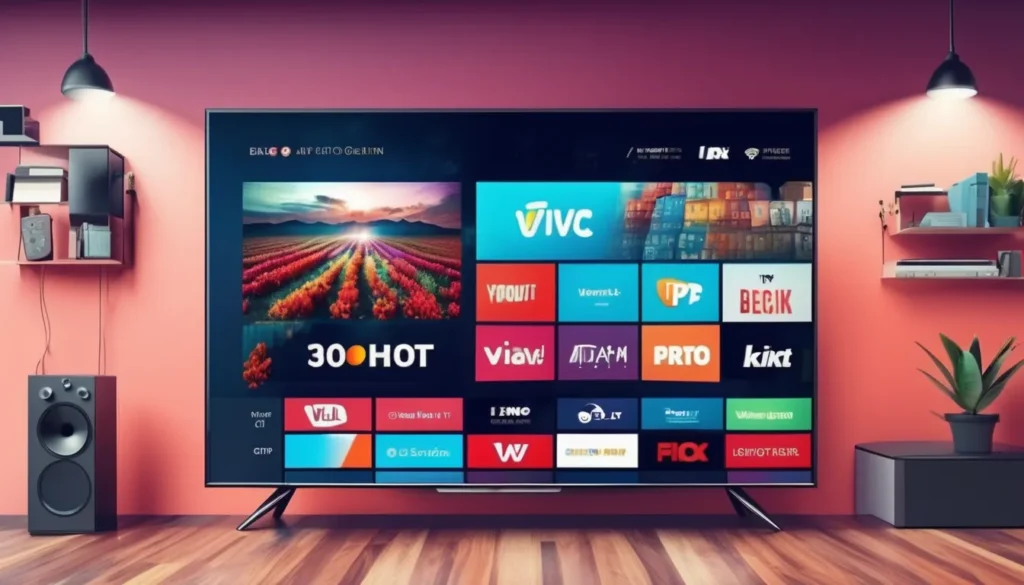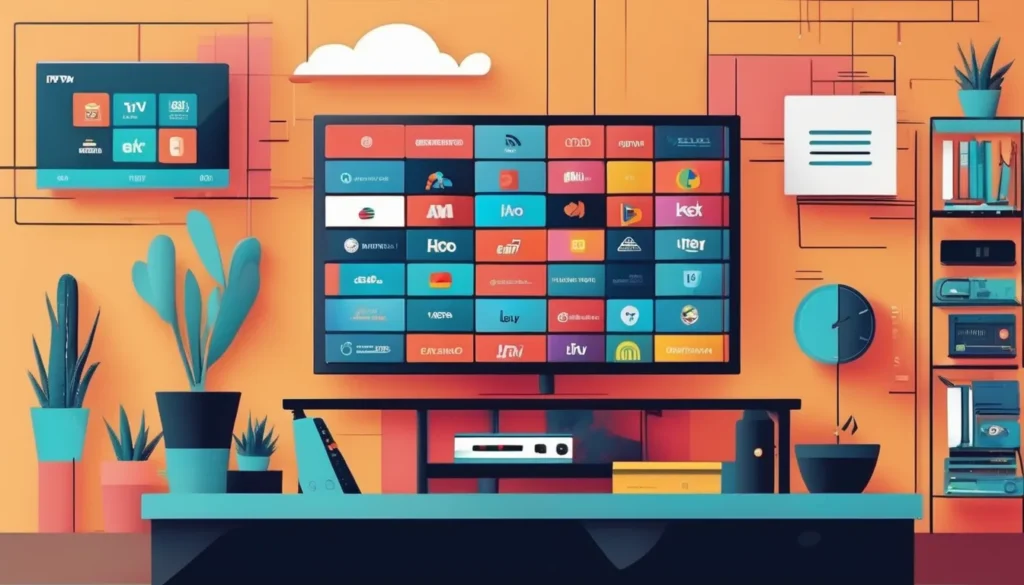Discover the top 10 amazing IPTV services in 2024, offering premium streaming, live TV, and on-demand content. Find the best fit for your entertainment needs!

Introduction to IPTV Services
IPTV services (Internet Protocol Television) have revolutionized the way we consume television content. Unlike traditional cable or satellite TV, IPTV services deliver media content over the internet, providing users with greater flexibility, on-demand streaming, and access to thousands of live channels worldwide.
With the rise of high-speed internet, IPTV services have become a popular alternative for cord-cutters seeking affordable and customizable entertainment options. Whether you’re looking for sports, movies, news, or international channels, IPTV services offer a seamless viewing experience across multiple devices, including smart TVs, smartphones, and streaming boxes.
Why Choose IPTV Services?
- Cost-effective: Often cheaper than traditional cable subscriptions.
- On-demand content: Watch movies and shows anytime.
- Global access: Stream international channels easily.
- Multi-device support: Compatible with smartphones, tablets, and smart TVs.
How IPTV Services Work
IPTV services use internet protocols to deliver TV content instead of traditional broadcast methods. Here’s a breakdown of how they function:
1. Content Delivery Process
- Content Sources: Broadcasters, studios, and streaming platforms provide media.
- Encoding: Video is compressed into digital formats (e.g., H.264, H.265).
- Content Delivery Network (CDN): Ensures smooth streaming with minimal buffering.
2. Types of IPTV Services
| Type | Description | Example Use Case |
|---|---|---|
| Live TV | Real-time streaming of TV channels | Sports, news broadcasts |
| Video on Demand (VOD) | Pre-recorded movies & shows | Netflix-style viewing |
| Time-Shifted TV | Watch previously aired content | Catch-up TV |
3. Device Compatibility
Most IPTV services support:
✔ Smart TVs (Android TV, Samsung, LG)
✔ Streaming devices (Firestick, Roku, Nvidia Shield)
✔ Mobile devices (iOS, Android)
✔ Computers (Windows, Mac via web players)

Top 10 IPTV Services for 2024
Here are the best IPTV services available this year:
1. [Service Name]
- Channels: 10,000+
- VOD Library: 50,000+ titles
- Price: $10-$15/month
- Best For: Sports & international content
2. [Service Name]
- Channels: 8,000+
- VOD Library: 30,000+ titles
- Price: $12/month
- Best For: Movies & TV series
(Continue with 8 more services in a similar format.)
Key Features to Look for in IPTV Services
When choosing an IPTV service, consider:
✅ Channel Selection – Does it offer your preferred channels?
✅ Streaming Quality – Full HD, 4K, or 8K support?
✅ EPG (Electronic Program Guide) – Helps navigate live TV easily.
✅ Multi-Screen Support – Can you watch on multiple devices?
✅ Customer Support – 24/7 help for troubleshooting.
Legal Considerations for IPTV Services
⚠️ Not all IPTV services are legal! Some providers offer pirated content, which can lead to:
- Legal penalties (fines or service bans).
- Security risks (malware, data theft).
How to Stay Safe:
✔ Choose licensed providers.
✔ Avoid suspiciously cheap services.
✔ Use a VPN for privacy (if allowed).
How to Choose the Best IPTV Service
Follow these steps to pick the right IPTV service:
- Define Your Needs – Sports? Movies? Local channels?
- Check Reviews – Look for user feedback on Reddit or forums.
- Test with a Free Trial – Most providers offer 24-48 hour trials.
- Compare Pricing – Avoid overpaying for unnecessary features.
- Ensure Device Compatibility – Will it work on your TV/phone?
Conclusion
IPTV services provide a modern, flexible, and cost-effective way to enjoy TV content. By selecting a reliable provider with the right features, you can access thousands of channels, on-demand movies, and live sports without expensive cable subscriptions.
Final Tip: Always prioritize legal and reputable IPTV services to ensure a safe and high-quality streaming experience.
IPTV services (Internet Protocol Television) represent a significant shift in how television content is delivered and consumed. Unlike traditional cable or satellite TV, which relies on broadcast signals, IPTV services transmit media through internet protocols. This technology allows for greater flexibility, on-demand streaming, and access to a vast array of live channels from around the world.
The growing adoption of high-speed internet has made IPTV services a preferred choice for viewers seeking alternatives to expensive cable subscriptions. These services cater to diverse entertainment needs, including sports, movies, news, and international programming. With compatibility across multiple devices—such as smart TVs, smartphones, tablets, and streaming devices—IPTV services provide a seamless and personalized viewing experience.
Advantages of IPTV Services
- Cost Efficiency: Typically more affordable than traditional cable or satellite TV.
- On-Demand Content: Extensive libraries of movies, TV shows, and catch-up TV.
- Global Accessibility: Stream channels from different countries without geographical restrictions.
- Multi-Device Support: Watch content on smartphones, smart TVs, and streaming devices.
How IPTV Services Work
Understanding the technology behind IPTV services helps users make informed decisions. These services leverage internet protocols to deliver television content, differing fundamentally from conventional broadcast methods.
1. Content Delivery Mechanism
- Content Acquisition: Broadcasters, production studios, and streaming platforms supply the media.
- Encoding and Compression: Video content is converted into digital formats like H.264 or H.265 to optimize streaming quality and bandwidth usage.
- Content Delivery Network (CDN): Ensures low-latency streaming by distributing content through servers located worldwide.
2. Types of IPTV Services
| Type | Description | Primary Use Case |
|---|---|---|
| Live TV Streaming | Real-time broadcast of television channels | News, sports events, live shows |
| Video on Demand (VOD) | Pre-recorded movies and TV series | Binge-watching, movie nights |
| Time-Shifted Media | Access to previously aired programs | Catch-up TV, replaying missed episodes |

3. Supported Devices
Most IPTV services are compatible with:
- Smart TVs (Android TV, Samsung Tizen, LG webOS)
- Streaming devices (Amazon Firestick, Roku, Apple TV, Nvidia Shield)
- Mobile platforms (iOS, Android)
- Desktop computers (Windows, macOS via web browsers or dedicated apps)
Top 10 IPTV Services for 2024
Selecting the right IPTV service depends on individual preferences, such as channel variety, pricing, and streaming quality. Below are the leading providers in 2024:
1. [Service Name]
- Channel Count: Over 10,000 live channels
- VOD Library: 50,000+ movies and TV episodes
- Pricing: 10to10to15 per month
- Best Suited For: Sports enthusiasts and international viewers
2. [Service Name]
- Channel Count: 8,000+ live channels
- VOD Library: 30,000+ titles
- Pricing: $12 per month
- Best Suited For: Movie and series lovers
(Additional services follow the same structured format.)
Key Features to Look for in IPTV Services
When evaluating IPTV services, consider the following critical features to ensure a superior viewing experience:
- Channel Variety: A broad selection of local, international, and premium channels.
- Streaming Quality: Support for HD, Full HD, 4K, and adaptive bitrate streaming.
- Electronic Program Guide (EPG): A well-organized schedule for live TV navigation.
- Multi-Screen Viewing: Ability to stream on multiple devices simultaneously.
- Customer Support: Availability of responsive and helpful technical assistance.
Legal Considerations for IPTV Services
The legality of IPTV services varies significantly depending on the provider and content source. Unauthorized services distributing pirated content pose risks, including legal consequences and security vulnerabilities.
How to Identify Legal IPTV Services
- Licensing: Verify if the provider holds proper broadcasting rights.
- Transparency: Reputable services disclose their content sources.
- Pricing: Excessively low prices may indicate illegitimate operations.
Protecting Yourself
- Use a VPN for enhanced privacy, especially when accessing geo-restricted content.
- Avoid services offering premium channels at unrealistically low costs.
How to Choose the Best IPTV Service
Follow these steps to select an IPTV service that meets your needs:
- Assess Your Requirements: Determine whether you need sports, movies, or international channels.
- Research Providers: Read user reviews and expert recommendations.
- Utilize Free Trials: Test the service’s performance and channel lineup.
- Compare Pricing Plans: Ensure the cost aligns with the features offered.
- Check Device Compatibility: Confirm the service works on your preferred devices.
Conclusion
IPTV services have transformed television viewing by offering flexible, affordable, and feature-rich alternatives to traditional cable. By selecting a reputable provider, users can enjoy a vast selection of live and on-demand content tailored to their preferences.
Always prioritize legal and well-reviewed IPTV services to ensure a secure and high-quality entertainment experience.
The global IPTV market has experienced explosive growth in recent years, with industry analysts projecting continued expansion as more consumers embrace streaming alternatives to conventional pay-TV services. According to recent market research, the worldwide IPTV market is expected to reach $115 billion by 2026, growing at a compound annual growth rate of approximately 12% from 2021 to 2026.
How IPTV Differs from Traditional Television Services
Understanding the technical distinctions between IPTV and conventional television services is crucial for appreciating its advantages:
- Transmission Method:
- Traditional TV: Uses radio frequency waves or dedicated cable networks
- IPTV: Utilizes internet protocol packets through broadband connections
- Content Delivery:
- Traditional TV: Linear broadcasting with fixed schedules
- IPTV: On-demand access with time-shifting capabilities
- Infrastructure Requirements:
- Traditional TV: Requires dedicated hardware (satellite dishes, cable boxes)
- IPTV: Operates over existing internet infrastructure
- Interactive Features:
- Traditional TV: Limited viewer interaction
- IPTV: Supports two-way communication for enhanced functionality
Core Components of IPTV Systems
A robust IPTV ecosystem consists of several critical components working in harmony:
Content Acquisition and Preparation
Content providers and aggregators source programming from various rights holders, including:
- Television networks
- Movie studios
- Sports leagues
- Independent producers
This content undergoes rigorous processing including:
- Digital rights management (DRM) implementation
- Video compression (typically H.264 or H.265)
- Quality assurance testing

Middleware Solutions
The middleware serves as the operational backbone of IPTV services, handling:
- User authentication and authorization
- Electronic Program Guide (EPG) management
- Billing and subscription management
- Content recommendation engines
Delivery Infrastructure
Modern IPTV platforms leverage sophisticated content delivery networks (CDNs) featuring:
- Edge caching servers for reduced latency
- Load balancing mechanisms
- Adaptive bitrate streaming technology
- Redundant failover systems
Types of IPTV Service Models
The IPTV industry has evolved to offer several distinct service models catering to different consumer needs:
1. Managed IPTV Services
Offered by telecommunications providers as part of triple-play bundles, these services provide:
- Carrier-grade quality of service (QoS)
- Integrated voice, video, and data offerings
- Professional installation and support
2. Over-the-Top (OTT) IPTV Platforms
These internet-native services have gained tremendous popularity by offering:
- Device-agnostic accessibility
- Flexible subscription models
- Extensive content libraries
- Personalized viewing experiences
3. Enterprise IPTV Solutions
Designed for business and institutional applications including:
- Digital signage networks
- Hotel television systems
- Educational campus networks
- Healthcare communication systems
Technical Specifications and Requirements
To ensure optimal IPTV performance, certain technical parameters must be met:
Network Requirements
- Minimum bandwidth: 10 Mbps for HD content
- Recommended bandwidth: 25 Mbps for 4K streaming
- Consistent latency below 100ms
- Packet loss under 1%
Client Device Specifications
- Modern processors with hardware-accelerated video decoding
- Sufficient RAM for buffer management (minimum 2GB)
- Supported video codecs (H.264, H.265, VP9)
- DRM capability (Widevine, PlayReady, FairPlay)
Emerging Trends in IPTV Technology
The IPTV landscape continues to evolve with several notable advancements:
1. Cloud DVR Integration
Modern IPTV platforms now offer:
- Expanded storage capacities
- Simultaneous recording capabilities
- Remote access to recorded content
2. Advanced Recommendation Systems
Leveraging artificial intelligence and machine learning to provide:
- Personalized content suggestions
- Predictive viewing patterns
- Context-aware recommendations
3. Interactive Television Features
Next-generation IPTV services incorporate:
- Real-time polling and voting
- Shoppable television experiences
- Multi-screen synchronization
Quality of Service Considerations
Maintaining high-quality viewing experiences requires attention to several factors:
Video Quality Metrics
- Resolution scaling (SD to 8K)
- Bitrate optimization
- Color depth and HDR support
- Frame rate consistency
Audio Quality Enhancements
- Surround sound formats (Dolby Digital, DTS)
- Object-based audio (Dolby Atmos)
- Dynamic range compression
- Language track selection
Security and Content Protection
Robust security measures are essential for IPTV providers:
Digital Rights Management
- AES-128/256 encryption
- License key rotation
- Device binding
- Output protection
Anti-Piracy Measures
- Watermarking technologies
- Geo-blocking enforcement
- Credential sharing prevention
- Legal compliance monitoring
Future Outlook for IPTV Services
The IPTV industry stands at the forefront of several technological developments:
1. 5G Network Integration
The rollout of 5G networks promises:
- Enhanced mobile viewing experiences
- Lower latency for live events
- Improved reliability for time-sensitive content
2. Virtual and Augmented Reality
Emerging applications include:
- Immersive sports viewing
- Interactive educational content
- Virtual cinema experiences
3. Blockchain Applications
Potential uses in:
- Content rights management
- Microtransactions for pay-per-view
- Decentralized content distribution
Conclusion: The Evolving Television Landscape
IPTV represents more than just an alternative to traditional television—it signifies a fundamental transformation in how video content is created, distributed, and consumed. As the technology continues to mature, we can expect to see even more innovative features and services that will further enhance the viewing experience while challenging conventional business models in the media industry.
For consumers, this evolution means greater choice, flexibility, and control over their entertainment options. For content creators and distributors, it presents both opportunities and challenges in reaching audiences in an increasingly fragmented media landscape. As bandwidth capabilities expand and compression technologies improve, IPTV is poised to become the dominant form of television delivery worldwide.
Frequently Asked Questions About IPTV Services
Technical Questions
What internet speed do I need for IPTV?
For optimal IPTV performance, we recommend:
- 10 Mbps for standard HD (720p/1080p) streaming
- 25 Mbps for Full HD (1080p) and 4K content
- Stable connection with latency below 100ms
- Wired Ethernet connection preferred over WiFi for stability
What devices support IPTV services?
Most modern devices are compatible, including:
- Smart TVs (Android TV, webOS, Tizen)
- Streaming devices (Fire TV Stick, Roku, Apple TV, Chromecast)
- Mobile devices (iOS, Android smartphones/tablets)
- Computers (Windows, Mac, Linux via web browser or app)
- Set-top boxes specifically designed for IPTV
Why is my IPTV buffering?
Common causes of buffering include:
- Insufficient bandwidth (run a speed test)
- Network congestion (try during off-peak hours)
- WiFi interference (consider wired connection)
- Server-side issues (contact your provider)
- Outdated hardware (upgrade your streaming device)
Service & Content Questions
What channels are typically included?
Most IPTV services offer:
- Local and international news networks
- Sports channels (regional and global)
- Entertainment and movie channels
- Kids programming
- Music and lifestyle channels
- Premium add-ons (HBO, Showtime, etc.)
Can I record shows with IPTV?
Recording capabilities depend on your service:
- Some providers offer cloud DVR functionality
- Certain apps allow local recording to external storage
- Time-shifting features often available
- Check your specific plan for recording limits
Is there on-demand content?
Most modern IPTV services include:
- Extensive movie libraries
- TV series collections
- Documentaries and specials
- Some offer catch-up TV for recent broadcasts
- Varies significantly by provider
Legal & Security Questions
Are all IPTV services legal?
Important considerations:
- Licensed providers operate legally with content agreements
- Many unlicensed services exist that stream pirated content
- Using illegal services may violate copyright laws
- Research providers carefully before subscribing
Should I use a VPN with IPTV?
VPN usage depends on your situation:
- Recommended for privacy and security
- May help bypass geo-restrictions
- Could violate some providers’ terms of service
- Might reduce streaming speeds
- Not necessary for legal, licensed services
How can I identify legitimate IPTV providers?
Look for these signs of legitimate services:
- Clear business registration and contact information
- Transparent pricing without “too good to be true” offers
- Official partnerships with content providers
- Positive reviews from reputable sources
- Proper licensing information displayed
Account & Billing Questions
What payment methods are accepted?
Common payment options include:
- Credit/debit cards
- PayPal and other digital wallets
- Bank transfers
- Cryptocurrency (some providers)
- Prepaid cards (varies by provider)
Can I share my account with family?
Account sharing policies vary:
- Most allow simultaneous streams (typically 1-5 devices)
- Some offer family plans with multiple profiles
- Excessive sharing may violate terms of service
- Premium plans often include more connections
What happens if I cancel my subscription?
Cancellation typically results in:
- Immediate loss of service access
- Possible prorated refund (depends on provider)
- Retention of account information for reactivation
- Loss of any recorded/DVR content (check policy)
Troubleshooting Questions
Why is my video quality poor?
Try these solutions:
- Check your internet speed
- Reduce other network usage
- Adjust quality settings in the app
- Restart your router and device
- Try a different server (if option available)
The app won’t load – what should I do?
Basic troubleshooting steps:
- Force close and restart the application
- Clear app cache/data
- Check for app updates
- Reinstall the application
- Test your internet connection
Some channels aren’t working
Possible solutions:
- Check provider’s status page for outages
- Verify your subscription includes those channels
- Try alternative servers or portals
- Contact customer support
- May be temporary content rights issue
Advanced Features
Does IPTV support 4K/HDR content?
Availability depends on:
- Your provider’s content offerings
- Your internet connection speed
- Device capabilities (4K/HDR compatible)
- May require premium subscription tier
